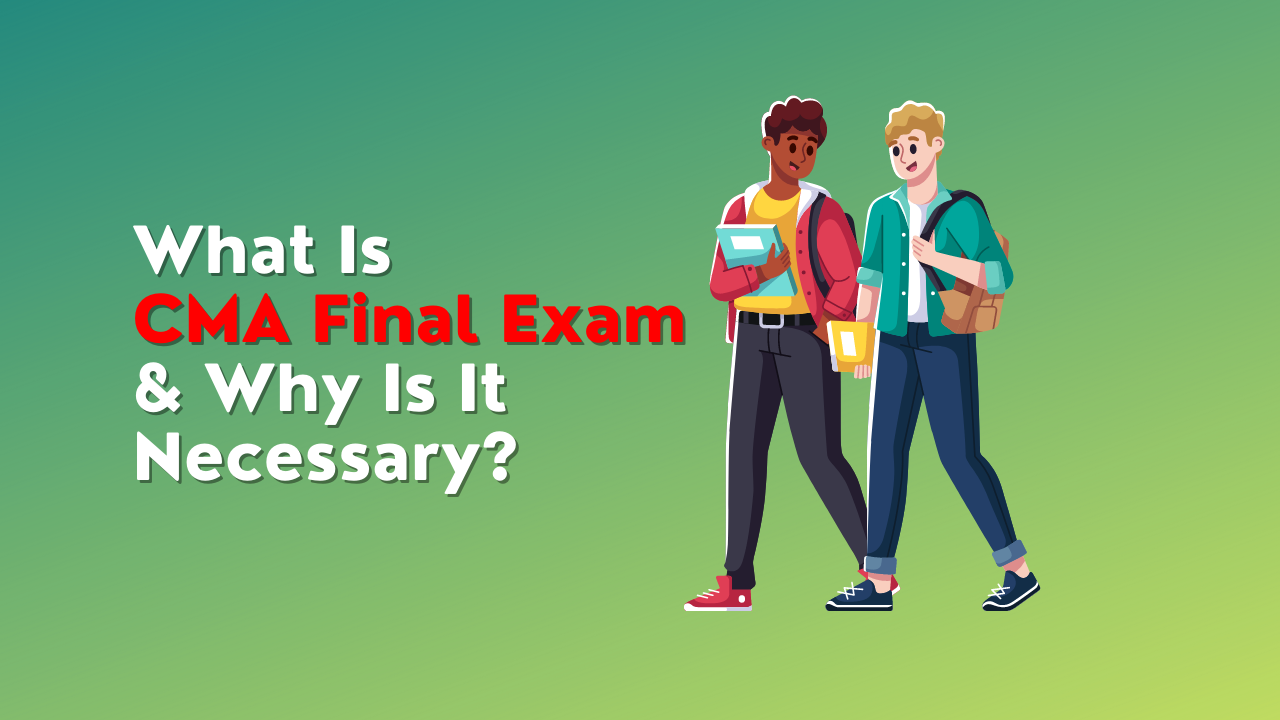
What Is The CMA Final Exam And Why Is It Necessary?
A Certified Management Accountant (CMA) is a profession that specialises in the financial management and accounting of businesses and organisations. This qualification proves that an individual has knowledge of both financial accounting and strategic business management. As a result, the CMA training process focuses on business decisions rather than audits, taxes, and other traditional accounting documents.
Earning a CMA certification is a great career move, especially if you want a job in management accounting. However, before starting, it is important to understand all aspects of the course including qualifications, exam structure, salary, and prospects offered.
CMA Final Qualification Criteria
Till now you have learned Financial control, Auditing, Financial evaluation, Cost, Management, Taxation, Management Accounting, Performance Management, Planning, and Budgeting.
In CMA Final you will have a syllabus as mentioned below-
Study Material for CMA Final
On the official website of ICMAI, candidates may download the CMA Final study guide. Candidates can get CMA Final study material, which covers the whole CMA Final syllabus, from the official website. In order to do well on the exam, it is crucial for applicants to go through every chapter included in the CMA Final exam study material. The CMA Final study guide includes 8 subjects and offers the candidates useful insight as they prepare for the exam.
CMA Final Syllabus
After passing the CMA Intermediate exam, students are eligible to take the CMA Final exam. They can become certified Cost and Business Accountants only upon successful completion of the final course. CMA final (groups 3 and 4) has 8 papers.
Paper GROUP – III
Paper 13 Corporate Laws & Compliance (CLC)- It acquires specialised knowledge of company functions related to company law and affiliated company law. To be able to assess whether strategies and organisations are aligned with established regulatory frameworks.
Paper 14 Strategic Financial Management (SFM)- Strategic financial management is not just about managing your company's finances, it is about managing your finances with the intention of being successful. This means achieving the company's long-term goals and objectives and maximising shareholder value over the long term.
Paper 15 Strategic Cost Management– Decision Making (SCMD)- Strategic cost management is an approach focused on reducing operating costs to make your business more competitive. Specifically, it integrates cost information into decision-making structures as a means of enhancing an organisation's business strategy.
Paper 16 Direct Tax Laws and International Taxation (DTI)- The main purpose of introducing direct tax law and international tax law is to acquire knowledge of direct tax law and international tax law as it applies to the relevant rules and principles arising from key cases, and to provide practical and legal guidance on various application situations. It is to provide insight into the provisions.
Paper GROUP – IV
Paper 17 Corporate Financial Reporting (CFR)-Corporate Financial Reporting is a system for preparing corporate financial reports. The financial statements of these companies are the income statement, balance sheet, cash flow statement, retained earnings statement, and financial policy statement.
Paper 18 Indirect Tax Laws & Practice (ITP)- Taxes are classified into direct taxes and indirect taxes. Direct taxes are paid directly by the taxpayer. Indirect tax is paid indirectly by the taxpayer. Indirect tax laws and practices tell you about the rules and regulations followed by it.
Paper 19 Cost and Management Audit (CMAD)- The main purpose of introducing the Cost and Management Audit (CMA) is to provide an educational institution for the training of future professionals to excel in the field of management accounting. The objective of the subject is to promote knowledge and facilitate decision-making and management skills related to governance and corporate management in general.
Paper 20 Strategic Performance- Strategic performance management is about more than maintaining a work environment that serves the needs of all employees. This includes many support processes that must exist. Strong leadership, healthy interpersonal relationships, continuous and constructive feedback, and collaboration.
Recommended Books For CMA Final
Exam Pattern for CMA Final
The exam is administered by the Institute of Cost Management Accountants of India (ICMAI) and exam modes are both online and centre-based. The exam medium is English, and the multiple-choice and short-answer questions are assessed with a total of 100 marks. 3 hours of time is given for the exam in which no negative marking is done. To pass the exam you will also need to fit in the qualification criteria of the final examination.
Aside from the attractive salary scale and the potential for increased demand, the greatest opportunity CMA certification aspirants can expect is a wide range of career opportunities. This certification course can open the door to countless career opportunities in companies. After obtaining the management accountant qualification, candidates can apply for the following positions:
Things you can do after CMA Final
After completing your CMA Final, additional skills and experience are important as the
CMA post-course competition has a higher level of add-on qualification. Additional skills such as computer knowledge and communication skills are suitable for your career ladder. After completing the CMA course, you will be able to expand your knowledge in various industries.
© 2024 Scanner Adda All rights reserved | Design by Shuchita Technologies